Read Related Article #1: What is being done today
Read Related Article #2: QCC Holocaust Resource Center
Read Related Article #3: Survivor Profile: Steven Berger
Read Related Article #5: Tracing history: DNA Shoah Project seeks to reconnect kin
Read Related Article #6: 60 years from now: Maintaining the legacy of the Holocaust
Read Related Article #7: Survivor profile: Ethel Bauer Katz
Read Related Article #8: More resources on the Holocaust
Read Related Article #9: About the “Legacy of the Holocaust” series
“Here I was, two years old, and people were trying to kill me,” said Eva Kessner, who was born in Nantes, France in 1939. “That’s basically what was going on.”
Being that Kessner was so young when the war broke out, her memories are a mixture of flashes from her own memory and the stories she heard from the rest of her family throughout the years.
From the beginning of her life until she came to the United States when she was almost seven, Kessner said her family was on the run. They first had to get out of occupied France.
When Kessner was two-and-a-half years old in 1942, she and her family escaped across the border into Switzerland. They spent time in several different refugee camps in Switzerland.
“The Swiss were good to us,” Kessner said. “They let us stay there until the war ended, from 1942 to 1946.”
Because of a life spent on the run, Kessner said that she was a very anxious child. Her family came to the United States in July of 1946.
“Overall I came out of it feeling like I was very, very fortunate and very lucky because I got out with my parents,” said Kessner, whose grandparents and sister also survived. “I got out alive and I found out in later years how few people actually did and how many people did get killed.”
Kessner said that the transition once in the United States was very difficult for her. Due to a house shortage and the extremely limited resources her family came with, namely only $200, they were only able to find an apartment that meant she would have to attend school in a tough neighborhood. Also, they did not know the language.
“In those days they weren’t too helpful about getting you to adjust,” said Kessner, who also said her classmates were not aware of her background. “I just had to sink or swim. I managed but it was very difficult for me.”
The events of the Holocaust were something that was openly discussed in Kessner’s family, with the stories being retold in great detail.
“They talked about it forever, every day around the dinner table,” she said.
Kessner said that growing up during the Holocaust has made her more aware of the dangers in the world and the dangers facing the Jewish people. Because of this, she has become very involved with pro-Israel organizations and trying to prevent more genocide from occurring.
“We have five and a half million Jews in Israel whose lives are at stake right now and there are too many people in this country who just want to be isolationists and put their heads in the sand,” Kessner said. “Freedom, the wonderful thing we have in this country, has to be fought for all the time.”
Now a resident of North Shore Towers with her husband of 25 years, Peter, Kessner has two children and six grandchildren. In addition, her husband has two children and five grandchildren.
Previously, Kessner said that she did not think of herself as a survivor because she had not been in a concentration camp. However, she now knows the importance of sharing all survival stories.
“I’m a child survivor and I’m more aware of it now because we’ve lost so many of the concentration camp survivors and there are so few left,” Kessner said. “I’m feeling more of a responsibility now to tell my story.”





























